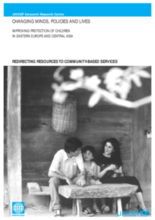One of the legacies of the command economy in Central and Eastern Europe and the former Soviet Union (Europe and Central Asia or ECA region) is a social protection system for vulnerable individuals which focuses heavily on institutional care. Universal social protection was provided to families in the form of guaranteed jobs and old-age pensions, as well as child allowances and benefits in kind such as housing, education, and health care. If an individual needed help beyond this level of universal support, an institutional placement was offered where available. Families, in turn were encouraged to use institutional care, instead of trying to keep the family member in the community and participating in school, work, or leisure, alongside others.
Research indicates that this approach of removing a child or adult from their family or community is more expensive per client served than more inclusive approaches designed to support individuals within their families and communities. Countries attempting to move away from this model of social care services face a number of constraints. In particular, there is the problem of how to finance new services given that individuals or their families are not normally able to do so. How can countries change the financing flows to support a menu of new options better tailored to the needs of individuals and without placing the burden of financing on vulnerable members of society themselves?
Reform of the social protection system in formerly planned economies is taking place against the backdrop of social and economic changes, including fiscal and political decentralization. In theory, decentralization offers a good context for reform, as it can provide communities with the resources and responsibilities to ensure that quality services are available to meet needs. In practice, it has been a challenge, since implementation has not always had this effect. Facilities – rather than resources – are often decentralized, and a market for services does not exist. Local governments end up using institutions rather than empowering families to resolve problems using a variety of approaches and tools. The more financial resources that flow into institutions, the less will be available for providing other services or serving more people. This cycle needs to be broken in order to meet community needs.
The objective of this paper is to provide a framework to help countries re-orient their financing systems for social care in such a way as to facilitate a programme of reform. The ultimate goal is for countries to move away from institutional care towards more family-based and inclusive care programs which are generally more effective in meeting social needs and which are, at least on a unit-cost basis, less expensive.
©UNICEF and The World Bank

